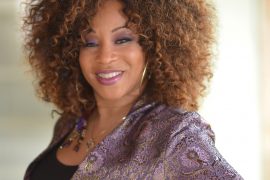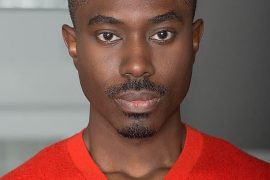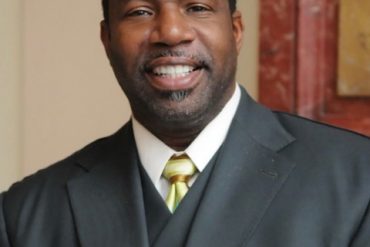When Arlieta Hall found out her father was declining from Alzheimer’s disease, she quit her job to help him live the best life he could live for as long as he lived. She knew it wouldn’t be easy, but she didn’t realize that their journey would give her a new life. As she began to talk about their experiences together, she found laughter amid pain, she found purpose beyond her dedication to family, and she found a community hungry to destigmatize an illness that is affecting so many people.
Partnering with friend and fellow filmmaker Brittany Alsot, the two embarked on making a documentary, “Finding Your Laughter,” and most recently were awarded $150,000 from Black Public Media’s (BPM) PitchBlack competition for their documentary about the ups and downs of Hall’s life balancing caregiving to her Alzheimer’s-ailing father with her comedy career.
Hall is a host, actress, improviser, stand-up comedian, writer, Certified Dementia Communication Specialist, and a first-time filmmaker from Chicago. You might recognize her as Sadie on Showtime’s The Chi series. She is a co-producer and cast member of the award-winning live standup sketch improv show “My Best Friend Is Black,” which the Chicago Reader hails as the best comedy show in Chicago for the last two years.
Alsot is a protégé of Academy Award short-listed director Mike Attie, who taught her the power of a participant-centered approach to documentary filmmaking. She’s applied this technique to producing, filming, and editing short videos with and about young cancer patients at Seattle Children’s Hospital. Brittany continues to focus on work that impacts underrepresented communities.
We were able to catch up with the filmmakers to talk about their win at BPM’s PitchBlack and the journey of making this film.

Reggie Ponder: This film really delves into a deeply personal and often painful experience caring for your father through Alzheimer’s while navigating your own mental well-being. What sparked that initial impulse to put this pain into laughter on stage?
Arlieta Hall: I went to an improvised open mic and got asked to go to a real open mic, and then I thought, “What am I gonna talk about?” My father had just wandered off on me that same day, and it was scary. I was crying, and I told my mom. My mom said, “I’m so sorry, but it’s just kind of funny how you’re describing this. I’m not trying to laugh, but this is kind of funny.” And then my stepmom was laughing ’cause she saw me chasing my dad. So then I thought, “Hmm,” and I went to the open mic and I actually shared the story of me taking care of my father and him wandering off. People came up to me afterwards of different backgrounds and shared they had to take care of their aunt with Alzheimer’s and similar issues they were dealing with. I thought, “Oh, this is not just my story,” and it just encouraged me to start sharing the frightening stories of caregiving in a comedic way to kind of give light to caregiving.
Reggie Ponder: That makes perfect sense. Taking that vulnerability from the stage to the screen is a significant leap. What motivated you to develop this very, very personal narrative into a full-fledged film?
Arlieta Hall: So when I came over to take care of my father, I would just, I’ll be using my improv method. I went through a program to become a certified Dementia Communication Specialist, where we utilize improv to communicate with people who have Alzheimer’s or dementia. So I was just over here going along with everything that my father said, and then just going along with his regular lifestyle. He loves stepping, Chicago dancing, and he loves his old school music. He loves Earth, Wind, and Fire. How am I going to have an attitude with Earth, Wind, and Fire on the song “Reasons”? I would then dance with my father, record it, and post it just like everybody else does on social media. Like they take pictures of their food they’re eating. I was just taking a small snapshot of my day, and I put it online, and people would be like, “Oh my God, I love to see what you’re doing with your dad. This is such a unique approach. This is so cool. Y’all look so happy, and we love this.” And I was like, “Wow.” Let me talk to Brittany, who is my friend who’s actually a filmmaker, because I’m not a filmmaker. So I talked to Brittany about it, and Brittany was like, “Okay, I’m gonna come over and I’ll come film you all.” I was just going to do some short stories at first. And then Brittany came over and filmed and was like, “No, no, no, no, no, friend, we have something way more than this. I’ve never seen anything like this. And just this. We think about Alzheimer’s and dementia, and we see it in a very sad light.” When Brittany came over, she was validating me, “This is so unique, this is so cool. I can watch you and your dad for hours. So just share this and make this a film.”

Reggie Ponder: Brittany, how did you first connect with Arlieta on this project?
Brittany Alsot: Arlieta and I became friends several years ago on a film set. And then she asked me to come film some things in her life. She was doing a show for her birthday, which was extremely extravagant. She was dancing and performing improv, and doing comedy. I had invited all these other artists to come in, and it was a whole show. It was a lot of fun. Then she told me about what was going on with her dad, and she asked me to come and film with him while he was still pretty lucid and coming and sitting at the kitchen table with them. They just had such a unique relationship that I just wanted to really stay in that moment. I lost my own dad when I was little, and I just saw this relationship that I didn’t get to have and really wanted to preserve that and help my friend tell her story.
Reggie Ponder: Brittany, what was it about Arlieta’s story and vision that resonated so deeply with you?
Brittany Alsot: I think just Arlieta’s improvisational approach to life is so unique and something that I’ve learned so much from. Just seeing the ways that she’s able to navigate so many different kinds of relationships using improv. It’s just something that I think everyone could learn something from. And the way that she was open to me coming over, really opening up her life, and really wanting to collaborate on this creatively was the perfect opportunity for me as a filmmaker and as her friend.
Reggie Ponder: Brittany, you were not only capturing Arlieta’s commentary but also documenting the incredibly sensitive journey of her father’s decline. How did you navigate the emotional weight of the process?
Brittany Alsot: Yeah. It’s been a very deeply collaborative process. I think I started out maybe knowing a little bit more about how filmmaking works, but Arlieta just wanted to dive in and be a full partner and collaborator on it. We both learned so much because making a feature is really different than making the shorts that I had made previously. We had conversations about all aspects of the process, and what does this mean and what do we wanna do with this? And our friendship has deepened. I think our creative collaboration has deepened to the point that we are usually on the same page. Sometimes I have to push her a little bit on the comedy because I think she’s very funny. Even if she thinks that she’s gotten better from previous times. And people might need to see a little bit of a progression of where does a comedian start and where do they end up? So I’m always trying to encourage that for the storytelling process. Arlieta is actually really great at stepping back. It’s hard to tell a story about yourself and to step back and think of yourself as a character and what’s gonna be best for the story and not like what’s embarrassing or what’s hard to process for yourself. This was just a wonderful creative partnership.
Arlieta Hall: I just want to just add that Brittany mentioned I’ve had to step out of it, and I know that I’m the co-director, producer, and cinematographer as well, but I’m also a daughter watching my father die in front of my eyes. So, receiving feedback, I’ve had to step out of it in multiple ways. People will just ask you anything and provide their thoughts like, “Why don’t we see more of your father when you’re younger? Can, do you have this? Do you have that? Can you wash your daddy up again?” And I’m thinking, “Could you just leave me and my daddy alone?” But then I had to take myself out of it as Brittany said, and look at it as a character. What do I want this character to show? I know I experienced the journey, but accepting the feedback, knowing what’s feedback, and knowing you don’t have to apply everything, but hearing and listening helped us to understand how to really commit and make the best project.

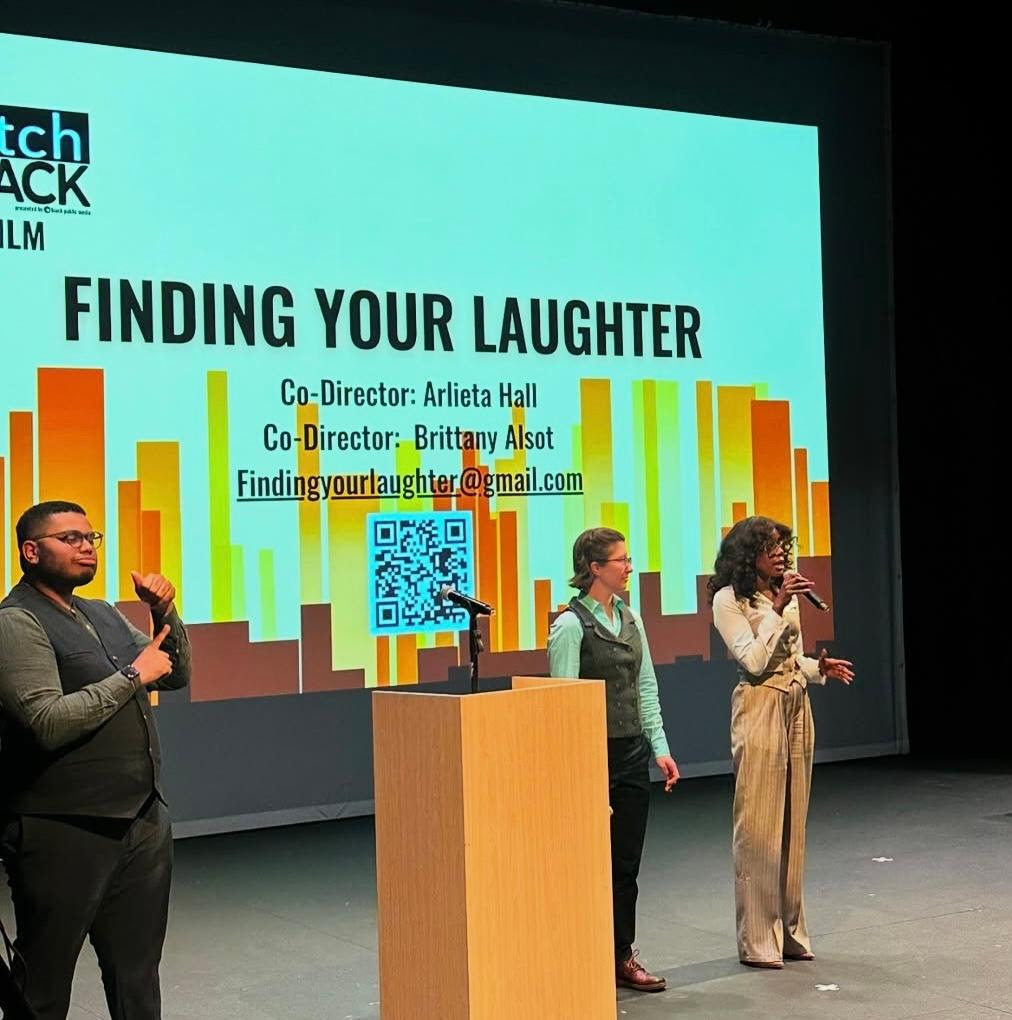
Reggie Ponder: How did you even hear about PitchBlack and this prestigious competition, and what was the process of participating?
Arlieta Hall: So we originally met Black Public Media in 2022 when we were selected to be in the Gotham Market Week. We were one of 10 documentaries for the Spotlight on documentaries there. And we met with over 28 people and different businesses within the industry, and Black Public Media was one of those. We applied then for their open call, and then we weren’t selected, but we kept the conversation going. When they told us that open call is back, we applied. Not only did we have to submit a proposal with a budget we also submitted 20 minutes of sample scenes.
And then once that process went through, I’m not sure how many applications they received, but we were notified that we were actually admitted into the Pitch Black 360 incubator program, which starts with an actual bootcamp. We had a few virtual meetings online, and then we went to New York for a bootcamp weekend, which is a Saturday and a Sunday, where we learn how to pitch our documentary. We come there with a rough pitch, and of course, nobody’s is that good when you get in the door.
So we get all this incredible feedback from everyone within the industry of Black Public Media . From Carol to Denise to Keisha Cameron to Sandy. We just got a lot of good feedback, and then we take that back home, reworkING our pitch. And we had four different pitch practices with them. We also practiced with our executive producer, Yvonne Welbon, and we practiced with our mentor Chloë Walters-Wallace, just to get other feedback too. So once we practiced, we went out there, pitched it, and we won.
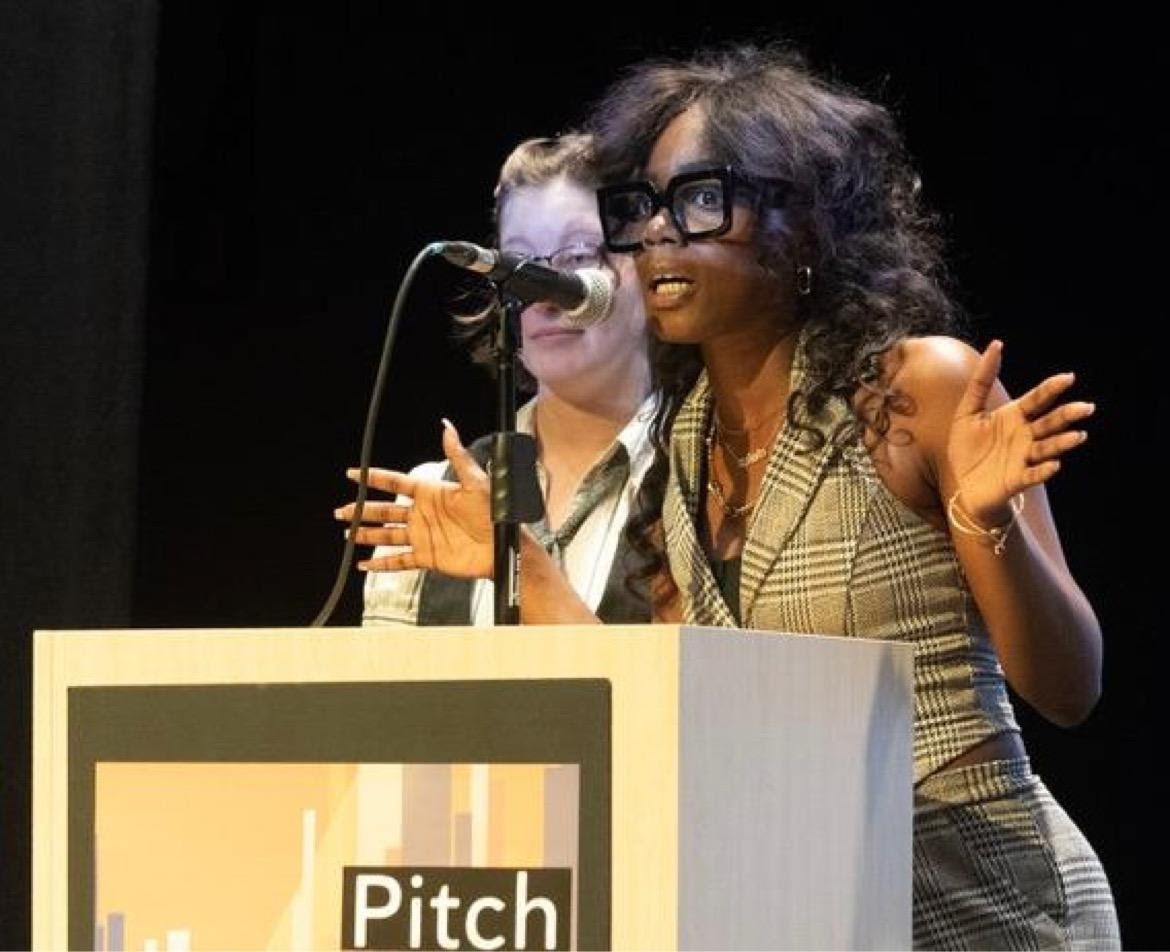
Reggie Ponder: What was that experience like receiving the award at the legendary Apollo Theater? Brittany, let’s start with you.
Brittany Alsot: Yeah, it was really amazing to be in Harlem. And we were staying in the Renaissance Hotel, so you’re like just vibing off this creative energy of the Harlem Renaissance. We met so many industry people and really connected better with our fellow filmmakers and immersive creators. It was an amazingly creative time, and it felt so good to be able to really present our project and feel the way that people in the room connected with it. It feels like a great launching point for finishing the film this year, which is possible because of this award.
Reggie Ponder: Arlieta, how was it for you being at The Apollo?
Arlieta Hall: I’m an entertainer, so I was like, “Oh, I’m at the Apollo!” Then I was like, “You’re at the Apollo, bring it down. This is public television. This is not that, so calm down.” I did check myself a couple times, but I was so excited because I’ve been watching The Apollo since I was a kid. I’ve always wanted to be on that stage, but I never thought I would be on the stage being as vulnerable as I was talking about my life. I always thought I would be entertaining people, but I met people there who were caregivers. It was a very full-circle moment of, “This is why you’re doing this film. These are the people that you’re doing it for.” And even though everyone in here is in the industry, we could take those titles off. They’re people, they’re caregivers, and they’re here for you. So I just felt very connected in that moment. I just felt so supported. Like Brittany said, you can come up with an idea, but to actually be in a room of people who believe that your idea is great, “We love it. We wanna see it through fruition.” BPM told us, “We’re family. We’re not just this organization. We’re your family now.” So to walk, to go to Harlem, with just me and Brittany practicing off of our note cards, and to leave with family, Harlem changed my life, and it changed the life of our project. So thank you so much to BPM.
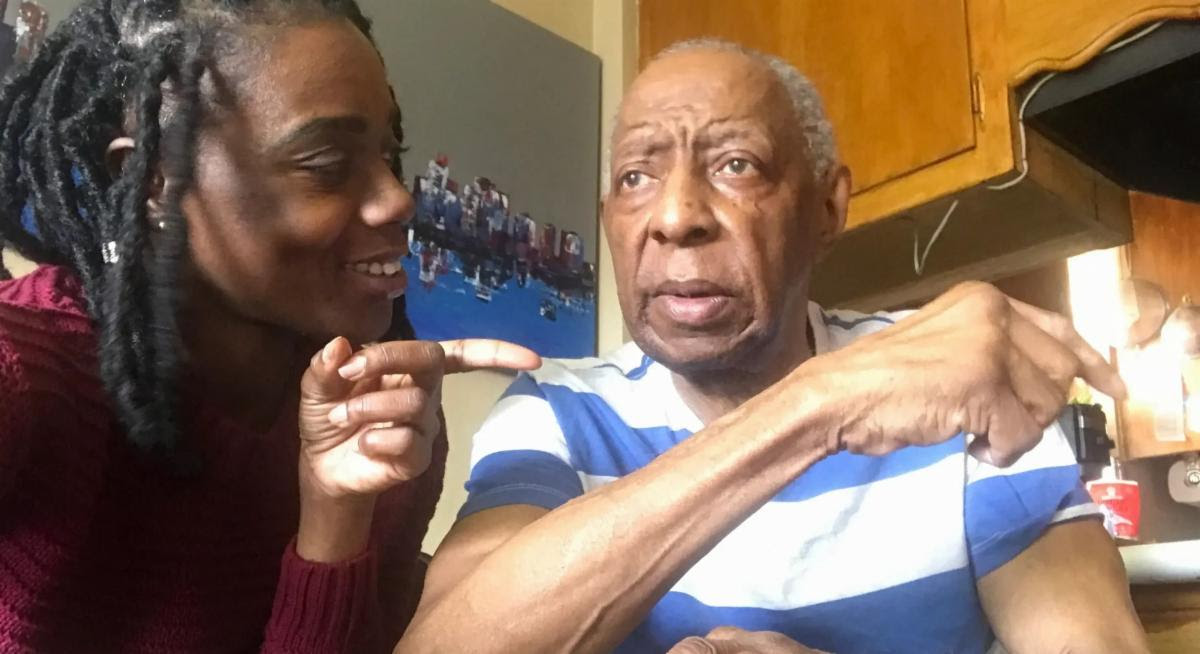
Reggie Ponder: Arlieta, you talked about the power of “Yes” in communicating with your father, and I could tell from the trailer that you had a very strong support system throughout his care. Can you talk about that?
Arlieta Hall: Yes. I was not alone. I was a caregiver along with my step-bonus mom, Charmaine, who was my dad’s wife for about 30 years. She’s been in my life since I was 10 years old, and she and my father took care of her mom with Alzheimer’s up until the day that she passed away. So after her mom passed away a few years later, here comes my father being diagnosed with the same thing. I came over and I told my stepmom, “I’m about to quit my job as a caseworker to help you.” And she said, “I don’t need any help.” I’m like, “Yes, you do.” So, we decided that we were gonna take care of my dad hand in hand and use laughter, ’cause she was also like, she’s an artist. She didn’t want to shut my dad off. And more so, she wanted to have her husband. So I’m not going to tell him he’s confused. I’m not going to make him feel like I’m taking care of him. “This is still my husband.” It was very dope to watch my stepmom allow him to lead, even though we were using the “yes, and” method. Even though we agreed with everything my dad does, like him taking the garbage out? But not really taking it out – he put the garbage on top of the table – we wanted him to still feel like he’s running this house. It was beautiful to see the love because I feel like I’ve watched a lot of movies and you think love looks this certain way, but when I saw her willing to be with my dad, no matter what – he confused, but her thing was, “I’m holding on to what’s still left and not what’s gone.” It just taught me and kind of pushed me to be there for my dad, even during the hard times. She would tell me even when it would be too hard, “Arlieta, just relax. Let him be, and just let the moment stay in the moment.” So even in those times, right when I can’t agree with everything, just sit in a moment and just let it be, and it’s okay. Being with my care pair was one of those amazing experiences. I wouldn’t have been able to do it without her.
Reggie Ponder: Brittany, it makes me think about the vulnerability that both Arlieta and her stepmom showed. Did you at any point in time feel a little bit intrusive as you were there filming?
Brittany Alsot: Yeah, it was. I’ve always been really grateful that Arlieta and Charmaine opened their home to me. And Milton, when he was still lucid, very gracious. And, very ready to be on camera. So yeah, it was something that I did not take for granted that I got to spend this time there with them. I think we also balanced that, especially in 2020, where Arlieta was filming herself, and Charmaine was helping to film some of these, like more challenging moments. That was also part of the time when Milton started to decline. And so a lot of it was actually just them as a family there recording it. And it was Arlieta choosing to turn on the camera and speak her really hard, emotional truths. I got to witness that in the edit room, as a co-director. And so it was, it was really important for me to be able to sit with that and to hold that for them. Hold the space for that.
Arlieta Hall: I want to comment on that. You asked Brittany if there was ever a time when she could have felt intrusive when filming. When my father was in hospice, I knew it was his last day – he was dying. I could start feeling his body getting cold, and I called Brittany. I said, “Brittany, I want you to come. This is it.” And she was like, “I don’t know.” I said, “No, I need you to be here. We need you.” And she said okay, came, and got like the last moments of me holding my dad’s hand and him leaving and us saying goodbye. And I know that’s not something she wanted to do. I just want to thank Brittany for being there for me and my family because we needed you, and you are part of the process of him leaving this earth.
Reggie Ponder: You talked about how “Finding Your Laughter” is a universal story. Is there anything particular about the film that screams Chicago?
Brittany Alsot: Chicago is a great city – it’s got really deep roots in the arts. We have some of the oldest film festivals here, and we’re known for comedy. So I think just like grounding the film in the reality of a caregiver on the south side of Chicago who’s also doing all these arts. That feels very Chicago to me.
Arlieta Hall: The comedy – Chicago comedy is like the roots for comedy. We birthed so many historic comedians here, and it just ain’t no style like Chicago. And then seeing the actual city is like in the background in my pictures. My stepmom is an artist. So you’ll see pictures of the house painted that she did, and then you’ll see the house. I feel that just being able to see the city is just, it’s so unique.
Reggie Ponder: Chicago or New York Pizza?
Arlieta Hall: Chicago Pizza ALL Day!
Brittany Alsot: I can’t eat cheese anymore, but Giordano’s is always gonna be the best.
Reggie Ponder: Chicago street food or New York street food?
Arlieta Hall: Now, Chicago does have overall better food than New York, but the New York bodegas, that bodega that I was going to in Harlem down the street, I’m talking about the organics, all these, the juices, the lunch bar, the dinner bar, the everything now was, I mean, they got me.
Brittany Alsot: Yeah, I have to agree. Like for quick food and like breakfast bagels, types, types of things. Like, New York really has it down. Like, we need to get our quick food game up here in Chicago.
‘Finding Your Laughter’ is currently under production.
ABOUT BLACK PUBLIC MEDIA.
Black Public Media supports the development of visionary content creators and distributes stories about the global Black experience to inspire a more equitable and inclusive future. For 45 years, BPM has addressed the needs of unserved and underserved audiences. BPM-supported programs have won five Emmys®,10 Peabodys, five Anthem Awards, 14 Emmy® nominations, and an Oscar®nomination. BPM continues to address historical, contemporary, and systemic challenges that traditionally impede the development and distribution of
Black stories.



